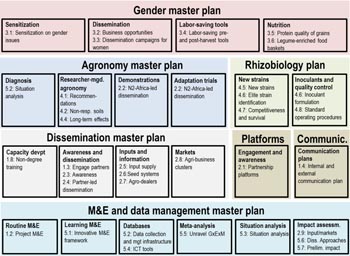The second phase of N2Africa is organized around a decentralized structure with much of the decision-making processes residing with the coordinators of the core countries, in close consultation with the project leadership and coordination team. This was a necessary modification to the structure of the first phase, in view of the more opportunistic, partner-led strategies required for delivering the vision of success of phase II: (i) the second phase aims at institutionalizing legume agronomy within the national systems, (ii) most of the dissemination goals of the second phase are planned to be delivered through partner-led dissemination, and (iii) the sustainability aspects of the important supply chains require a direct engagement with private sector partners in the respective countries. A potential risk associated with a decentralized structure is that N2Africa will end up as 5 (or 11, including the Tier-1 countries) independent projects whereby cross-country learning and meta-analysis is impossible. The N2Africa Master Plans are documents intended to foster a common approach across the five Core Countries, thereby leaving the necessary flexibility for local modification and adaptation. The plans are designed to achieve the N2Africa Vision of Success and are aligned to the Research Framework of N2Africa.
|
Work is progressing on the following Master Plans: Gender (led by Amare Tegbaru), Agronomy (led by Joost van Heerwaarden), Rhizobiology (led by Mahamadi Dianda), Dissemination (led by Edward Baars), Platforms (led by Alan Duncan), Communication (led by Peter Ballantyne), and M&E and Data Management (led by Theresa Ampadu-Boakye) (see figure – unintentionally looking like the new Windows starter page). It is expected for the various Master Plans to be completed by the end of August for their use and integration in the work plans for the September 2014 season. |
 |
Bernard Vanlauwe
